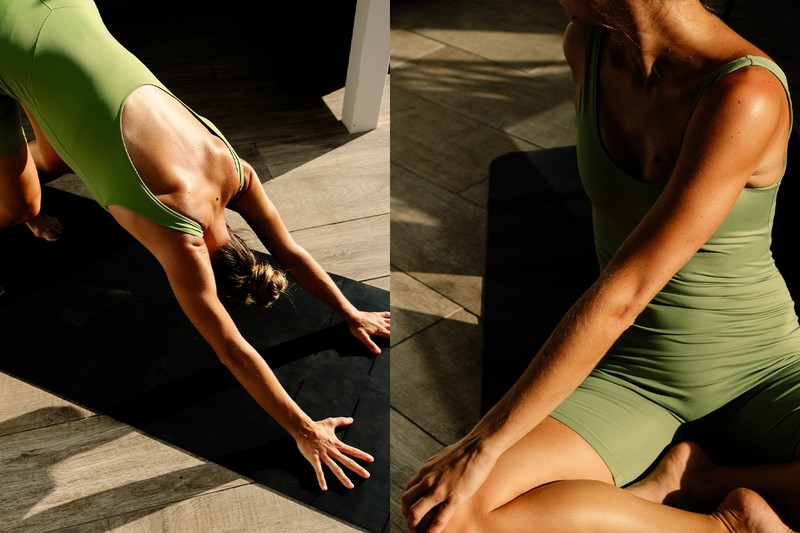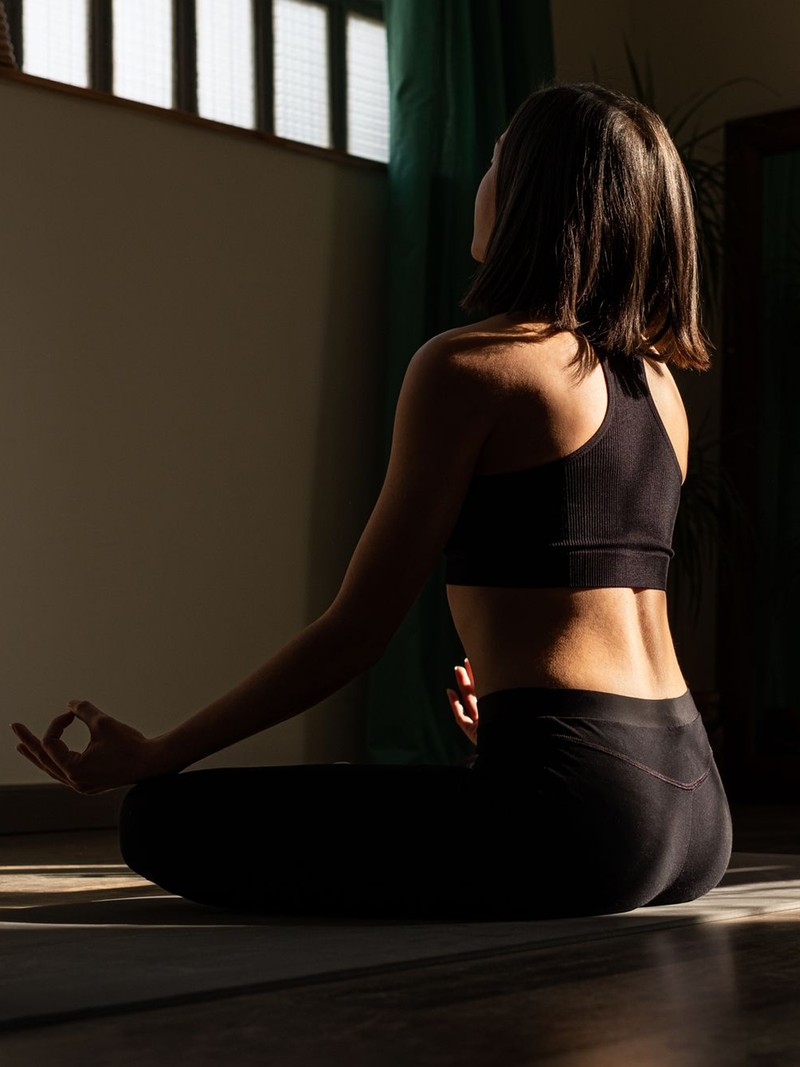10 Ways To Quiet Your Mind If You Struggle With Meditation
Be Present
“Mindfulness is living consciously in the present moment. It’s not just about meditation – the key here is observation. Consider yourself an observer of life happening around you, no matter how chaotic it may be, rather than as a participant in all the drama, and pay attention to the theatre of life unfolding in front of you. During work meetings, try to focus intently on every word your colleagues say, to every number on the slides being presented, to the body language being expressed. When chatting to friends, listen attentively, rather than actively crafting your response as they speak and waiting for your turn to sound off. On a date, maintain eye contact, be genuinely curious, and forfeit the idea that you need to calculate the right response. A master of mindfulness embraces the space between words and sentences rather than trying to anxiously fill it with noise.” – Mo Gawdat, bestselling author & podcast host
Breathe Away Anxiety
“The physiological sigh – also known as cyclic sighing – is very effective in stressful situations. It’s simple to do: breathe in through your nose, and when you’ve comfortably filled your lungs, take a second, deeper sip of air to expand your lungs as much as possible. Then, very slowly, exhale through your mouth until all the air is gone. After just one or two of these deep sighs, you may already feel calmer, but for the full effect, repeat for five minutes. A recent study showed this is the most effective technique in reducing stress in the moment when compared to other breathing exercises, with research showing the impact lasts longer, too.” – Ciara McGinley, meditation & breathwork practitioner & founder of Finding Quiet
Get Outside
“Incorporating nature into your daily routine is one of the most powerful things you can do for your wellbeing – even short bursts can have a big impact. Find a park, garden or any place with greenery, even if on your commute to work; put your phone on airplane mode for ten minutes; and sit or walk quietly in the natural setting, paying attention to the rustling leaves and the scents and sounds of nature. Notice the crooked trees, uneven landscapes, or even the awkward design of animals. Does it bother you these things aren’t perfect, or do they seem exactly as they should? No one stands before a crooked tree and demands it to be perfectly vertical. No one gazes at the ocean's vastness and yearns to mute its monotonous rhythm. We accept nature's idiosyncrasies and innately admire its chaotic beauty. Try to view your own life with a similar level of kindness.” – Mo
Try Box Breathing
“Being more aware of your breath is an effective and simple way to be more mindful. Sit for a couple of minutes with your feet on the floor, simply following your breath in and out, gradually deepening your breathing by prolonging the exhalation. Longer exhales cause the vagus nerve – a nerve that connects the brain to the body – to send a signal to your brain to activate your ‘rest and digest’ system, easing your ‘fight or flight’ response. Box breathing is also great: inhale for a count of four, hold for four and then exhale for four, repeating five times. This will calm the mind and body, alleviate anxiety and aid sleep.” – Nerina Ramlakhan, physiologist & sleep expert
Do A Body Scan
“If you struggle to get into the zone when meditating, a body scan can be just as effective. Lie down in a comfortable position and bring your awareness to each part of your body, starting from your toes and moving up to your head. Notice any tension or sensations without judgement. When you do this often, you’ll get into a habit of being an observer of your thoughts and feelings, rather than being lost in them. You are simply aware of them as they come and go like clouds passing in the sky. You don’t judge them as good or bad – you simply observe them. You can acknowledge your emotions in the same way – observing but not trying to change them.” – Elise Clayton, rapid transformational therapist & clinical hypnotherapist

Look Up
“In times of stress, it’s easy for your mind to go into overdrive, but a simple technique I like to use is to roll up my eyes as if I’m looking into my eyebrows or imagining a spot just above my head, take three deep breaths and close my eyes. Doing this produces alpha waves in the brain – this is the state of mind associated with relaxed awareness and day dreaming. Then, simply focus on your breath and repeat a mantra – inhale and exhale. Put your hand on your chest and feel the gentle rise and fall as you breathe in and out. You’ll find this instantly calms you and resets your mind.” – Elise
Check In With Your Senses
“If you feel overwhelmed, try a five senses check-in. Name five things you can see, four things you can touch, three things you can hear, two things you can smell, and one thing you can taste. This practice will bring you back to the present moment and ground you in your environment.” – Elise
Use Essential Oils
“Don’t underestimate the power of scent to calm the mind. Unlike other senses, scent is linked to the emotional centre of our brain, which controls memory and emotion. Find an essential oil you love and pop a drop on your hand, cupping your hands over your nose and taking a few deep breaths. The effect is twofold: not only can this help slow your breathing, but if it’s a scent you like and associate with relaxation, it’ll tell your brain that it’s safe and it’s okay to be calm.” – Claire Castle, holistic femininity coach
Practise Chair Yoga
“Mindfulness is a fantastic buffer against work stress and can help you focus on the task in hand. Chair yoga is a great way to reduce stress and improve wellbeing. It’ll lead to better breathing habits, too. Start by sitting up straight, lengthening your spine by imagining an invisible thread gently drawing you up through the crown of your head. Become aware of your body, noting the points of contact, like your bum on the chair and your feet on the floor. Take three deep breaths, feeling the energising quality of every inhale and the complete release in every exhale. You can then do some simple stretches – try a seated spinal twist or a cat-cow pose to ease tension in your back and chest.” – Dr Mahrukh Khwaja, positive psychologist & mindfulness teacher
Move Mindfully
“It’s no secret that yoga is an effective way to calm the mind, with studies showing a regular practice is associated with reduced cortisol levels, lower blood pressure and lower resting heart rate, as well as better blood glucose control and lower cholesterol. If you struggle with stress, try to incorporate yoga into your week – combining physical poses with breathing and relaxation enhances your ability to slow down. Studies also show mindful walking – noticing how your feet feel against the ground, and noticing the sights, smells and sounds of your environment – is a powerful way to reduce stress levels.” – Mahrukh
Find out more about Mo Gawdat’s BBC Maestro course on Happiness here. For more from the experts, visit DrNerina.com, HolisticFemininity.co.uk, Mind-Ninja.co.uk, FindingQuiet.co.uk & MakeUpYourMindset.com
DISCLAIMER: We endeavour to always credit the correct original source of every image we use. If you think a credit may be incorrect, please contact us at info@sheerluxe.com.


